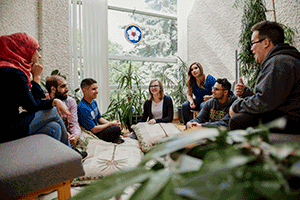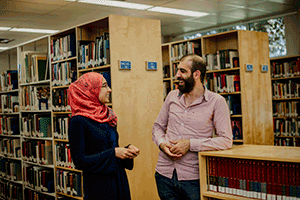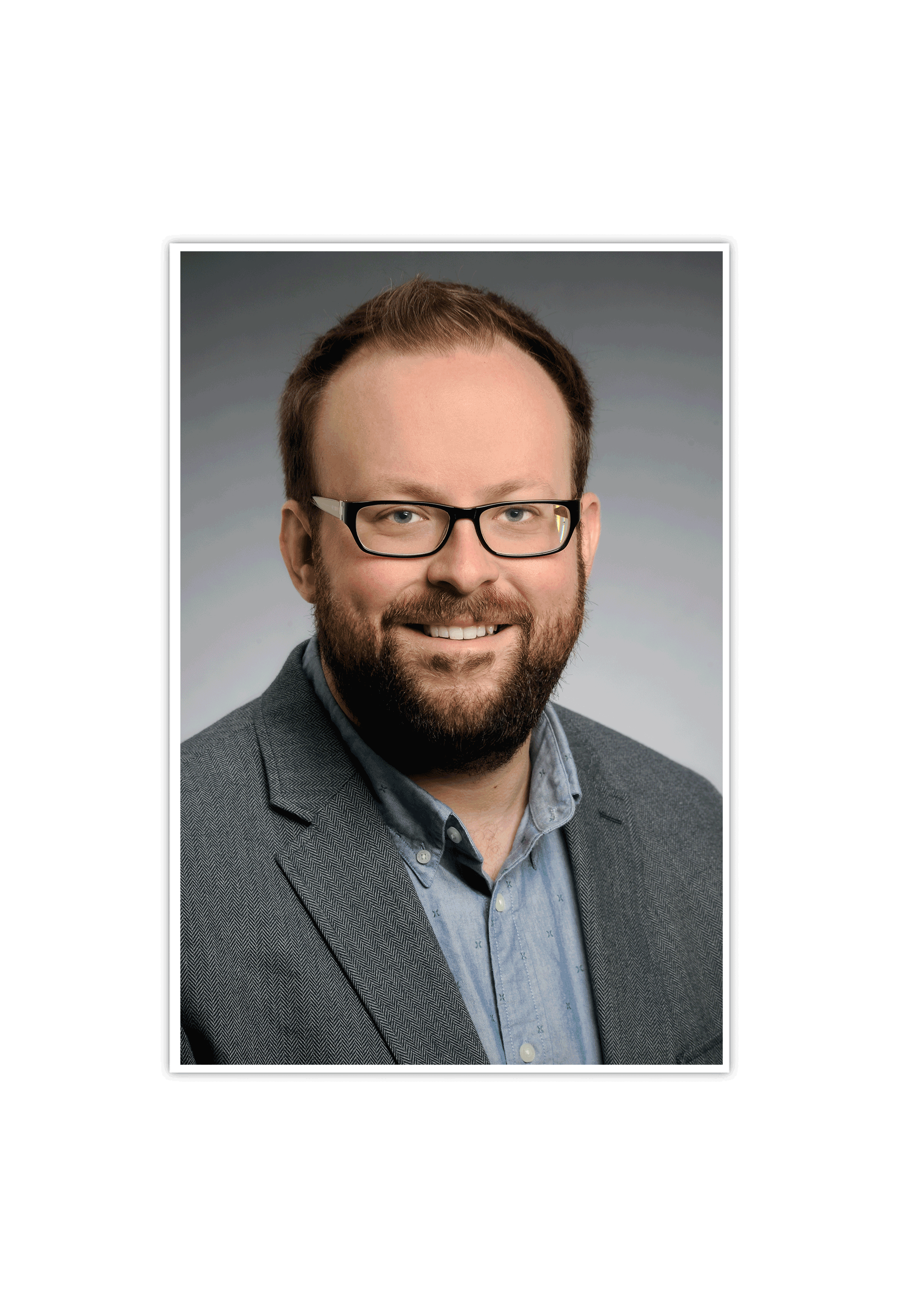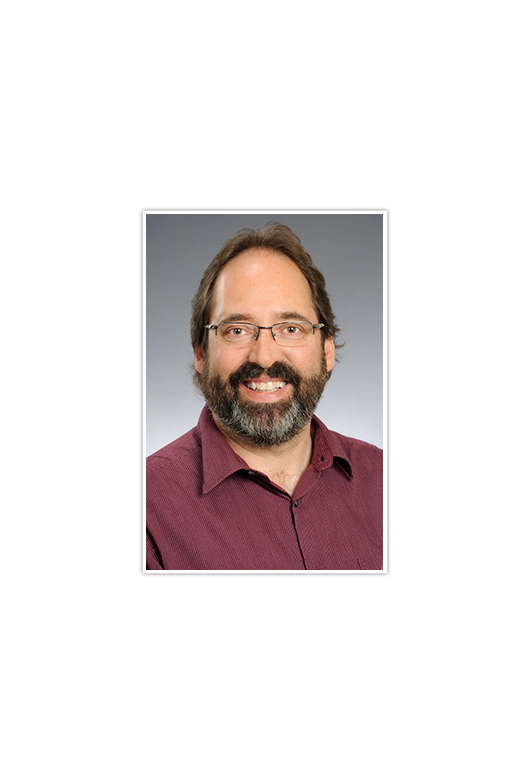Ready to learn more?
Get all the details straight to your inbox!

To enrol as a Luther College student, simply fill out the University of Regina application form and select Luther as your campus of choice.

Luther College is recognized for its high standards of teaching, focused research, and one-on-one academic advising. We value and protect this heritage of excellence in scholarship, freedom of inquiry, and faithful seeking after truth.

Free enrolment counselling support and invaluable one-on-one academic advising are available for all programs at Luther College.

Our student residence, The Student Village at Luther College, welcomes residents from ALL post-secondary institutions in Regina. Rooms come with a meal plan, free laundry, free wi-fi, and a great sense of community.

Luther College offers Bundles programs that group together first-year students and classes to give you a great start and help ease the transition from high school to university.

Luther students can register in Arts, Science, or Media, Art, and Performance. Luther students are U of R students and receive a U of R degree.

Luther College appeals to students who want to study in a safe, nurturing, and inclusive environment. We welcome students of all faiths, ethnicities, backgrounds, religions, genders, and sexual orientations.

The Luther Library has over 24,000 items in its collection, 5,000 books checked out per year, and 7,000 students who come through its door per month.
Get all the details straight to your inbox!
Good morning. My name is Scott Wilson. I am an English Instructor and the Coordinator of Luther’s Writing Across the Disciplines Program. It is a privilege to be able to speak to you today. 
When I told my Grandpa, Larry Ward, about this talk, he was delighted (though appalled I was not being paid for it); that’s classic Larry: always looking to make a buck.
He had a serious fall recently, broke his hip, so I’ve been thinking about him a lot. On days like today, it’s difficult to not think of family. After all, we don’t succeed entirely on our own even if my grandfather, depending on his mood, might protest that notion.
In a lecture titled “Wisdom in Nonsense: Invaluable Lessons from my Father,” Canadian novelist Heather O’Neill tells childhood stories about her petty criminal father and his nuggets of advice—many of which immediately seem like poor guidance—never keep a diary; never watch a Paul Newman movie; never share your scientific research, and beware of clowns—ok that last one seems useful.
O’Neill never takes any of her father’s advice and yet she can’t deny his significance. She said: “Although I broke all the rules that my dad gave me, they gave me a context for life. They made life seem exciting…gave me a sense that everything I did was important.”
O’Neill makes me think about my grandfather and if I’ve found wisdom in his nonsense—his contradictions: a military man who often broke the rules, a man who for years had impressive doctor checkups despite being a diabetic living on a Chunky soup, pumpkin pie, and whiskey diet, a Saskatchewan Roughrider fan even though he lived in Ottawa most of his life. I was intimidated of him when I was a kid (probably the uniform), but I later saw what a gentle man he is, a good role model after all.
Larry has a grade 3 or grade 5 education depending on who you ask; when he got out of the military, he worked in apartments, fixing anything that needed it. He was self-taught and let everyone know it.
At some point, he started losing out on jobs or would be passed over for promotions when people with degrees started appearing. They always sound like ghosts or time travellers in his stories. He couldn’t fathom the value of postsecondary education. Perhaps it was ignorance, insecurity, or both.
He dismissed degrees as “little pieces of paper.” He didn’t coin the phrase, but he may have the all-time record for using it.
Now, Larry isn’t entirely wrong. Your degree is an accomplishment, certainly, but it alone doesn’t determine your worth. What you do next, the choices you make, and the kindness you show others will determine that. The degree simply empowers you to succeed better with those choices and actions.
And, while Larry’s jabs at formal education caused me some concern because I always dreamed to go to university, he attended each of my graduations and can’t stop talking about how proud he is.
Sometimes the naysayers are on your side; they just don’t feel comfortable saying so. Other times, it takes them a long time to reveal it.
Larry was/is proud, but he still doesn’t understand all that goes into earning that “little piece of paper” or how it changes you for the better.
If we as teachers have done our jobs, and you’ve done your part too, you’re now more empathetic, informed, creative, and have tools to think better and more deeply.
I’m happy that Luther College graduates know to ask important questions, challenge the status quo, create change, and help the marginalized.
To some, certain types of learning feel more real and therefore more valuable than others. That is true with Larry; it’s probably true in your family as well.
I have English degrees and teach at a university and when I go to family events, I still am asked what I’m really going to talking about all that “mumbo jumbo.”
That may never stop, but don’t be discouraged because all you need to do is keep spending your time and energy on subjects, work, and people you love and it will work out.
For example, I can chart a direct line to this podium because I did not abandon my love for reading and writing. I can thank my parents and Grace Wilson, my grandmother, for that gift.
As a child, I would I would borrow the flashlight from my dad’s toolbox so I could read under the covers well past my bedtime: Charlotte’s Web and the Chronicles of Narnia, my dad’s old Hardy Boys books, and then his Stephen King novels that a nine-year-old probably shouldn’t be reading (but does explain a lot about me and my teaching and research interests). When my parents installed a light on the headboard, I continued making that reading tent until one night the bedsheet started smoking and I nearly burned the house down.
There was a lesson about the flammability of bedsheets and the danger of discount-bin lighting, but the reality is I still don’t go to bed at a normal hour, often because of books. That’s still my real world.
According to novelist John Green, “the whole idea of this [type of speech] is that I’m supposed to offer you some thoughts on how you might live a good life out there in the so-called Real World.” Green goes on to explain that the real world is no more or less real than this one.
Green is right. The real world doesn’t start tomorrow. You’re already in it. Your university experiences, on and off campus, weren’t just gaining a credential. Those time management skills, increased resilience and problem solving, your ability to communicate more effectively haven’t been one big simulation, (though a new season of Black Mirror just popped up on Netflix, so don’t quote me on that).
It’s understandable to think this isn’t real life. I mean, you probably don’t dress like this every day and we’re living in a time where education is underfunded and underappreciated. When you read the news or wander about on social media, the “realness” of learning or academics is often called into question—ivory towers, elitism, some sort of evil political correctness run amuck.
Hearing that can hurt because what we do here, what you did here, was try to make the world a better place.
Whether it’s your degree or anything else, don’t let people dismiss what you’ve done here.
It matters.
What you did on this campus certainly felt real: the hard work, the stress, the multitasking, the deadlines, feeling inspired, feeling cynical, then feeling hopeful.
You know, learning.
It certainly felt real to us.
Many of you have helped your community via experiential learning opportunities, learned about Truth and Reconciliation, volunteered to help those in need. You have done job placements, made contacts, and begun to throw yourselves into causes and career paths.
For those going on to more schooling, that one essay or project you put the most effort into, or that unexpectedly fulfilling elective may have set something in motion.
I wrote a Fight Club paper in a class at the University of Alberta years ago and suddenly I was here at the U of R defending a thesis about that book and movie.
Again, your real life is already in progress.
I say that, but sometimes we worry about steps too far away.
Ultimately, what you’ll remember about today is how proud your loved ones are right now.
Later, you’ll recall:
Let them do it.
All of it.
And be prepared for them to do the same thing for all of your many achievements and milestones yet to come.
As you do, listen to what they say—all of that invaluable nonsense and wisdom.
Congratulations and thank you.

I would like to begin by welcoming you to what I see as a great moment: a great moment for each of you, our graduands, and a great moment for Luther College. A great moment deserves a great speach and since that is a task beyond most of us, including myself, I did what any good humanist scholar and philosopher would do:
I combed through speeches from antiquity, in this case ancient Greece, to find a great speech! And knowing it is a recurring duty of faculty to give such ceremonial speeches on special occasions, I bookmarked it on my shelf a few years back, promising myself that the next time I had to give such a speech, I would shamelessly pilfer everything I could from it. Promises to oneself can be a good thing, but in this case it has horribly backfired for I have run into the what I call “the Lewis Carroll” trap. You may recall the apocryphal story of Lewis Carroll, the author of Alice’s Adventures in Wonderland who, as the story goes, promised Queen Victoria to dedicate his next book to her following the release of his highly successful children’s book. What you may not know is that Lewis Carroll, a pseudonym for Charles Lutwidge Dodgson, was also a mathematician so the next book he wrote—and supposedly dedicated to the Queen—was a mathematical work entitled An Elementary Treatise on Determinants. Not exactly what the Queen had in mind!
So let me explain my own trap. The speech I had selected is from the great Athenian statesman, orator, and general, Pericles, whose leadership, both civil and military, coincided with and propelled the Athenian golden age. Historically acclaimed by some as the “first citizen of Athens”, Pericles challenged the elites of his time, built up democratic institutions, and both defended and expanded the Athenian empire. A lover of education and a friend of prominant philosophers of his day, Pericles initiated and supported many of the cultural and religious buildings we continue to revere on the Acropolis—including the Parthenon. So far all well and good—what could possibly go wrong? The challenge is that the speech I chose is, in fact, a funeral oration. The speech is one Pericles was required to give by law for Athenians slain at the end of the first year of the Peloponnesian Wars with Sparta in 431 B.C. So how on earth does one take a grim oration and adapt it to a festive occasion such as this? You see my quandry.
Yet perhaps there are some parallels—if a bit tenuous. Pericles was marking a great transition, and, in looking at his speech there are elements that mark any great transition, whether joyful or sorrowful, that I think still have relevance today. Pericles’ speech was marking a transition in the lives of the soldiers who had perished, the lives of their families, and the lives of the Athenian city state and its allies. You too are beginning a new stage of your life journey, whether to employment, a further degree, a time of travel and exploration, or perhaps to begin a family. Your new journey will also affect your families who have supported you (likely to their financial benefit!) and your community here at Luther College and the University of Regina (as you move from students to alumni). Such transitions can be challenging and Pericles himself comments on how difficult it is to satisfactorily speak to any audience when such momentous occasions arise. He prefaces his remarks in this way:
It is hard to speak properly upon a subject, where it is even difficult to convince your hearers that you are speaking the truth. On the one hand, the friend who is familiar with every fact of the story may think that some point has not been set forth with that fullness which he wishes and knows it to deserve; on the other, he who is a stranger to the matter may be led by envy to suspect exageration if he hears anything above his own nature. For men can endure to hear others praised only so long as they can severally persuade themselves of their own ability to equal the actions recounted: when this point is passed, envy comes in and with it incredulity.
So as a professor addressing my scholarly friends, now graduands, I too have difficulty in praising your accomplishments in obtaining your degrees, partly because those external marks of accomplishment to which we, as faculty, are privy (your essays, exams, final grades, and awards) only hint at your accomplishments within: not only your intellectual development and those “aha” moments that you undoubtedly experienced at some unexpected points in your degree (and periodically revolutionized your entire ways of thinking!) but also your moral and social achievement as you were humanized by your courses in the liberal arts and sciences—the hallmark of the degrees you have pursued here at Luther College. And for those of you here today who are strangers to universities, for universities are very strange places, or strangers to the disciplines each of these students has pursued, it is difficult to appreciate the nature of their achievement even though one is aware of their time, resources, and effort expended.
Undaunted, Pericles begins his oration by invoking the ancestors of the Athenians who built and defended its institutions making the current protection of Athens and the valour of its fallen soldiers possible. In doing so, he notes the exceptional nature of Athenian democracy in his own times. Perhaps it is also a sage reminder for us as we cast our votes next week when globally so many democracies daily face the risks of tyrants and demagogues. Of Athens Pericles states:
Our constitution does not copy the laws of neighbouring states; we are rather a pattern to others than imitators ourselves. Its administration favours the many instead of the few: this is why it is called a democracy. If we look to the laws, they afford equal justice to all in their private differences; if no social standing, advancement in public life falls to reputation for capacity, class considerations not being allowed to interfere with merit; nor again does poverty bar the way, if a man is able to serve the state he is not hindered by the oscurity of his condition. The freedom which we enjoy in our government extends also to our ordinary life. There, far from exercising a jealous surveilance over each other, we do not feel called upon to be angry with our neighbour for doing what he likes, or even to indulge in those injurious looks which cannot fail to be offensive, although they inflict no positive penalty. But all this case in our private relations does not make us lawless citizens. Against this fear is our chief safeguard, teaching us to obey the magistrates and the laws, particularly such as regard the protection of the injured, whether they are actually on the statute book, or belong to that code which, although unwritten, yet cannot be broke without acknowledged disgrace.
So on this occassion, as a nod to our ancestors for their forsight in building Luther College and our federated partners here at the University of Regina, I too should say a few a words on the remarkable constitution of our College and University in these times. That collegial governance bears a strong affinity to democratic Athens and that our students soon to be graduates will now participate directly in the election of members of the University of Regina Senate, and indirectly its Board of Governors through the board members appointed by our elected Provincial Government, is not a surprise. The philosopher Plato, founded one of the earliest scholarly Academies that thrived in Athens and became the foundation of the modern university. Plato’s student Aristotle wrote the Athenian constitution into the very nature of our species claiming that “[hu]man[s] [were] born for citizenship”. Academic freedom legally allows each scholar to pursue their private scholarly interests. At the same time it preserves the collective right of scholars to pursue answers to the best questions of the time, whether, as ever, answers to these questions challenge the public consensus, expose what political leaders would rather hide, or challenge the economic assumptions and practices of our professions and trades. On this latter point, Jean Tirole, the Nobel Prize winner in Economics has observed, universities are one of the few examples of a worker cooperative, in a world dominated by private corporations. Akin to most city states ruled by monarchs and overlords in Pericles day, these modern corporations are similarly incapacitated by their lack of democracy and inclusivity—despite the great urgency to mobilize humanity to confront the dire sustainability challenges we face. Yet our universities, like democratic Athens, are their own unique small towns or city states, isolated communities swimming in a larger sea. And their unique institutional capacities allow scholars to achieve the greatness of Athens (and more!) as they have always done in times of crisis, whether it is in the rise of the earliest humanist colleges that populated the government administrations of Europe with able officials, or the rise of science leading to the engineers of the industrial revolution. So as soon to be graduates you will continue to be part of the great changes already occurring in this place.
As universities this institutional difference has allowed us to become pregnant (which perhaps explains our current grumpiness!). We are living laboratories about to give birth to new, sustainable ways of producing and living. For you who are soon to be alumni of Luther College this good news is especially poignant, as Luther College and the University of Regina have been chosen by the International Association of Universities to lead the global charge on “Responsible Consumption and Production”, goal 12 of the United Nations’ 17 Sustainable Development Goals. These goals, if you have not yet seen, are now beautifully depicted on our north staircase. So as Pericles would expect of any Athenian citizen travelling in foreign lands, we hope you too as graduates of this College and University would continue to defend its liberties, extol its virtues, and praise its ambitions beyond these walls.
But what is at the root of the novelty of the Athenian way of life? Pericles again cites a virtue shared with universities. He states:
Our [statesmen] have, besides politics, their private affairs to attend to, and our ordinary citizens, though occupied with the pursuits of industry, are still fair judges of public matters; for, unlike any other nations, regarding him who takes no part in these duties not [merely] as unambitious but [even] as useless, we Athenians are able to judge at all events ..., and instead of looking on discussion as a stumbling-block in the way of action, we think it an indispensable preliminary to any wise action at all. Again, in our enterprises we present the singular spectacle of daring and deliberation, each carried to its highest point, and both united in the same persons; although usually decision is the fruit of ignorance, hesitation [is actually the fruit] of reflection. But the palm of courage will surely be adjudged most justly to those who best know the difference between hardship and pleasure and yet are never tempted to shrink form danger. ...Such is the Athens for which these men, in the assertion of their resolve not to lose her, nobly fought and died; and well may every one of their survivors be ready to suffer in her cause.
That Pericles would found Athens’ success on a culture of daring deliberation, speaks well of you as graduands who, as part of your daily lives, will now continue to seek out what is novel and demand evidence in its support. For the liberty of each scholar is reflected in the liberty of each idea to have its own day in court—to be fairly tested and treated by scholarly methods—despite its origins in obscure or prominent academic departments or arising beyond these walls from the lowest or most privileged members of society. The wider world does not share these philosophical tendencies but is increasingly suspicious—if not hostile—to new (or old!) ideas that challenge their established beliefs (and the comfort these bring) not to mention the messengers who bring them. We are a society made up of intellectual tribes that increasingly diparage individuals and groups so as not to engage their ideas—regardless of merit. I believe I am not too bold in saying (in a Periclean vein) that you must now become scholarly warriors. As scholarly warriors, you do not use instruments of coercion (whether military, political, social, or economic), but your sword and shield are evidence and example. As the world wearies of bullies wearing the trappings of power (and all of their follies!) you will, I think, be pleasantly surprised that your scholarly patience and perseverence, despite setbacks in the wider world, will not be unrewarded by those citizens who have lost their way and are gradually won back by Athenian and scholarly ideals of deliberation. We are entering a philosophical age and as graduates your stars will continue to rise as you daily confront fallacies of reasoning and anti-scientific claims while morally challenging grinding greed and short-term thinking in promotion of the long-term citizen interest.
In closing, Pericles’ praise of the departed Athenian warriors is bound up with his praise of Athens itself. As he states,
...if I have dwelt at some length upon the character of our country, it has been to show that our stake in the struggle is not the same as theirs who have no such blessings to lose, and also that the panegyric of the men over whom I am now speaking might be by definite proofs established.
My praise of you as graduands on this both joyous and solemn occassion is part and parcel my praise for this college, our university, and the system of education that you now intimately know and hopefully have grown both to admire and love. Thank you and again congratulations.
Pericles. “The Funeral Oration of Pericles.” In Thucydides. The Peloponnesian War. Translated by Richard Crawley. Book II, Chapter 6. In Philosophic Classics: Ancient Philosophy. Volume 1. Edited by Forrest E. Baird and Walter Kaufmann. Third Edition. Upper Saddle River, N.J.: Prentice Hall, 2000. 56-60.